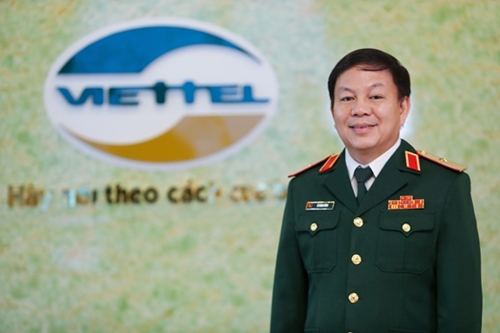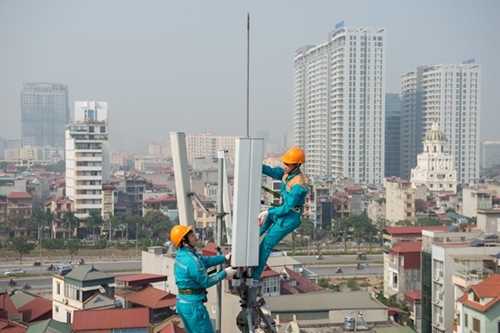In the short run, Viettel will focus on three major industries: telecommunication industry, defense industry and cyber security industry to raise the quality of its commercial services and products and to serve national defense, as well.
    |
 |
|
Acting Chairman and General Director of Viettel Le Dang Dung |
Recently, Acting Chairman and General Director of Viettel Major General Le Dang Dung granted an interview to the People’s Army Newspaper clarifying the groups’ short-run development plans and long-run vision.
Reporter: On September 27, 2019, Party General Secretary Nguyen Phu Trong signed Resolution 52-NQ/TW on policies to encourage domestic enterprises to participate in the fourth industrial revolution (Industry 4.0). Could you tell us about Viettel’s development plan in Industry 4.0?
Major General Le Dang Dung: In mid 2018, Viettel started to enter the fourth phase of its development history. In this phase, the group accelerates international integration and focuses on Industry 4.0. We have also adopted the mission of building a digital society in Vietnam.
But first, we should transform Viettel into a digital organization that operates on the basis of a united digital platform. Next, we should participate actively and proactively in the digital transformation process which contributes to shaping a digital society in Vietnam.
We have set three major tasks below.
We should continue building modern ICT infrastructure as all digital revolutions that are really based on modern ICT infrastructure.
We should pioneer in developing and providing digital applications and services, laying a basis for Vietnam to build a digital nation.
We should boost three industries, namely ICT, defense industry and cyber security.
The implementation of these three tasks will help Viettel catch up with its peers in developed countries in the context of Industry 4.0 on one hand and contribute to firmly protecting Vietnam’s national sovereignty in both physical and cyber space.
Reporter: According to Resolution 52 of the Party Central Committee, the country’s national digital transformation process is still lagging behind other countries as few domestic enterprises participate actively in the process. What do you think about the issue?
Major General Le Dang Dung: We should first have correct thinking about digital transformation. To successfully implement digital transformation, we should have both good infrastructure, particularly ICT infrastructure networks and favorable policies for it. At present, ICT networks of Viettel and other telecommunication companies are good for the digital transformation of domestic enterprises and the country as a whole. Domestic telecoms also pledge to upgrade their networks to facilitate digital transformation on request from enterprises and the government. The most important issue at this time is that there should be a legal framework and policies favorable for digital transformation. Particularly, the government should issue legal documents regulating the sharing of information and data, protection of private information and certification of electronic and digital signatures, in order to gradually complete institutions, facilitating digital transformation of the government, organizations and enterprises.
Reporter: What should Viettel do in order to successfully play its leading role in digital transformation?
Major General Le Dang Dung: In reality, Viettel has successfully developed and is providing the best services to its customers, such as its digital payment service ViettelPay and several digital content services and solutions for e-trade. In other words, Viettel’s customers have in fact begun to experience digital services and products.
In 2019, Vietnam started to provide several digital platforms of business management to other enterprises. The fact is that Viettel shared digital knowledge, experience and products with other organizations and enterprises after it had successfully conducted digital transformation inside its own apparatus.
    |
 |
|
Viettel has tested services on its 5G network. |
Currently, the need of organizations and enterprises for digital transformation is even higher than the Central and local governments. For enterprises, we have developed management solutions like Voffice. We also participate in major projects of the government, such as eCabinet, the National Document Axis, and the National Population Database.
As Viettel has digitalized its operations and management, it can develop products and services at comparatively low costs, which allows more organizations and enterprises to access its digital products and services. For instance, many people think that the SmartCity project implemented by Viettel in Hue would cost hundreds of billions of Vietnamese dongs, but it, in fact, costs only a few tens of billions of Vietnamese dongs. As the group can realize a SmartCity project at a low cost, a lot of cities and provinces can afford to invest in the model.
Reporter: The development of the SmartCity model in localities will contribute positively to the development of the country. Could you elaborate on the group’s role in developing the model in localities?
Major General Le Dang Dung: Viettel has studied various SmartCity models in the world over the past five years. Based on Vietnam’s typical features, Viettel has selected nine lines of products: Architectural structure, infrastructural products, interactive products, smart healthcare system, smart education system, smart traffic system, safety products, information security products and solutions, smart management system of press and media, and command and control centers.
When conducting a SmartCity project in a locality, Viettel may adjust some features to suite the scale and level of the locality’s socio-economic development but always strictly follows the principle of bringing benefits to local people and enterprises. This is because a smart city must provide a smart environment for the local government to interact and exchange with local people and enterprises as well as to quickly handle their issues. At present, Viettel serves as the consultant, designer, technical solution provider and infrastructure investor for SmartCity projects in localities across the country.
Reporter: How will Viettel invest and deploy a 5G network in 2020 and in the following years?
Major General Le Dang Dung: Viettel is playing a pioneer role in Industry 4.0 and is Vietnam’s first telecom that has tested services on its 5G network, meeting the three core features of the standard 5G network: high-speed, huge connection capacity, and low latency level.
In the coming time, Viettel will invest its 5G network in the localities that have a high need for data and give first priority to populous areas such as industrial zones, city centers and tourist attractions. In the past, when an area has had an increased need for data and connections, Viettel has built three or four more 4G BTS, but now it can build just one 5G BTS.
In fact, the 5G network effectively facilitates the development of hi-tech products and IoT solutions for smart homes, self-driven cars, and distance surgery. The 5G network also creates a new driving force for the development of industrial, hi-tech zones and plants, contributing to promoting national socio-economic development.
However, it will take several years for the Vietnamese economy and society to get such benefits from the 5G network as domestic telecoms are still developing 5G technologies and building their 5G networks. To accelerate this process, Viettel will first build its 5G network in economically and socially important areas.
Reporter: Could you give some forecasts on the domestic telecommunication market in 2020?
Major General Le Dang Dung: The growth in traditional communication services such as phone calls and messages will slow down at a rate of around 2%. But the demand for data use will steadily increase this year.
Viettel has planned to grow 10-15% in earnings so it will focus on providing digital products and services. Normally, digital services make up some 30% of the earnings of large international telecoms. Viettel is striving to reach this figure in one or two years’ time.
The government can also support domestic telecoms in introducing more digital products and services by lowering barriers to the domestic ICT sector.
Reporter: Thank you!
Translated by Thu Nguyen